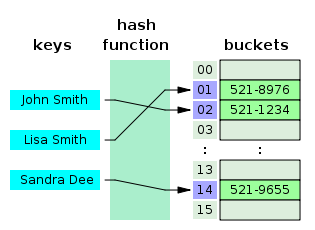
Distributed hash table
A distributed hash table (DHT) is a class of a decentralized distributed system that provides a lookup service similar to a hash table: (key, value) pairs are stored in a DHT, and any participating node can efficiently retrieve the value associated with a given key. Responsibility for maintaining the mapping from keys to values is distributed among the nodes, in such a way that a change in the set of participants causes a minimal amount of disruption. This allows a DHT to scale to extremely large numbers of nodes and to handle continual node arrivals, departures, and failures.
DHTs form an infrastructure that can be used to build more complex services, such as anycast, cooperative Web caching, distributed file systems, domain name services, instant messaging, multicast, and also peer-to-peer file sharing and content distribution systems. Notable distributed networks that use DHTs include BitTorrent's distributed tracker, the Coral Content Distribution Network, the Kad network, the Storm botnet, the Tox instant messenger, Freenet and the YaCy search engine.

Hash table
In computing, a hash table (hash map) is a data structure used to implement an associative array, a structure that can map keys to values. A hash table uses a hash function to compute an index into an array of buckets or slots, from which the desired value can be found.
Ideally, the hash function will assign each key to a unique bucket, but it is possible that two keys will generate an identical hash causing both keys to point to the same bucket. Instead, most hash table designs assume that hash collisions—different keys that are assigned by the hash function to the same bucket—will occur and must be accommodated in some way.
In a well-dimensioned hash table, the average cost (number of instructions) for each lookup is independent of the number of elements stored in the table. Many hash table designs also allow arbitrary insertions and deletions of key-value pairs, at (amortized) constant average cost per operation.
In many situations, hash tables turn out to be more efficient than search trees or any other table lookup structure. For this reason, they are widely used in many kinds of computer software, particularly for associative arrays, database indexing, caches, and sets.

